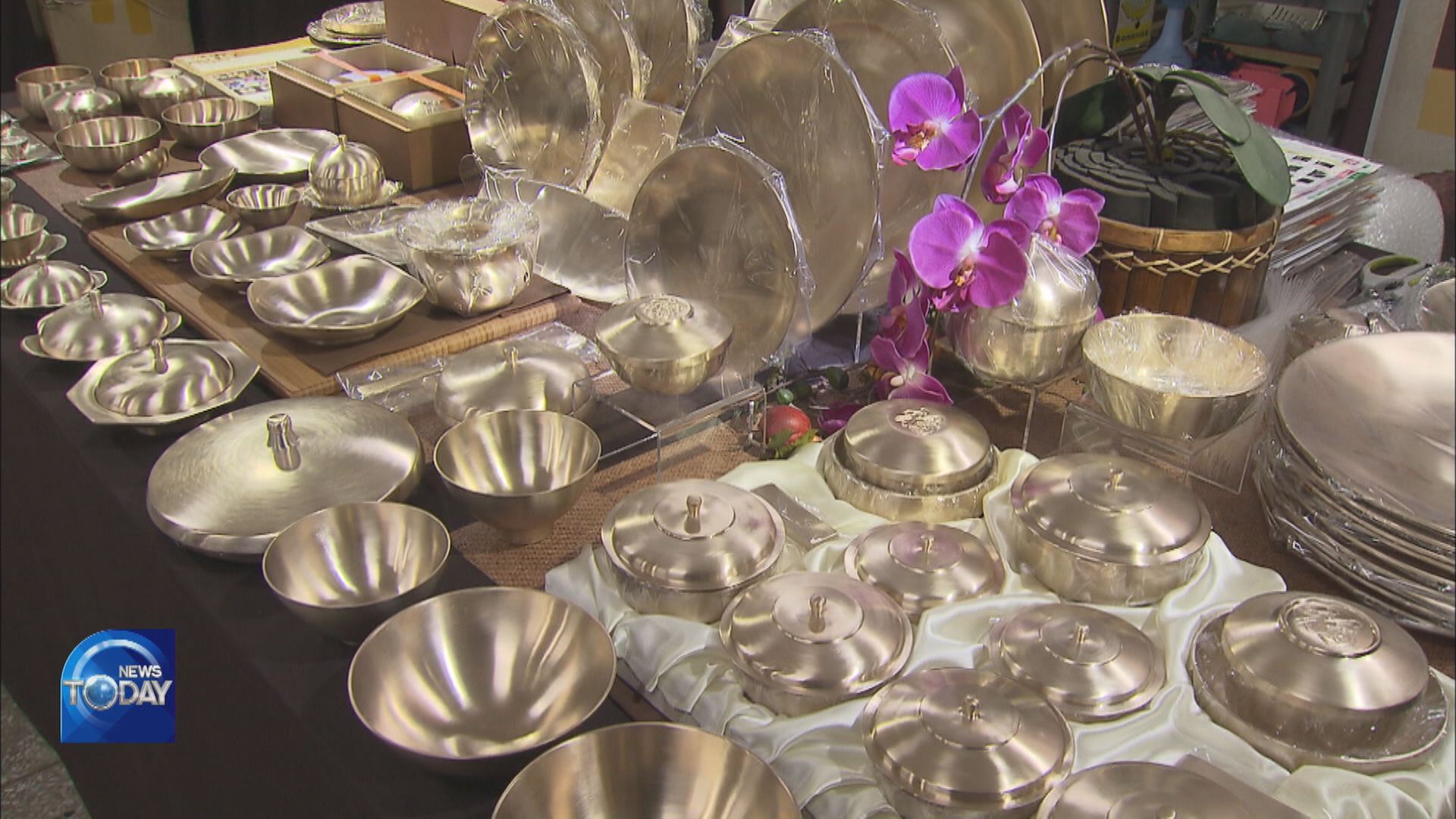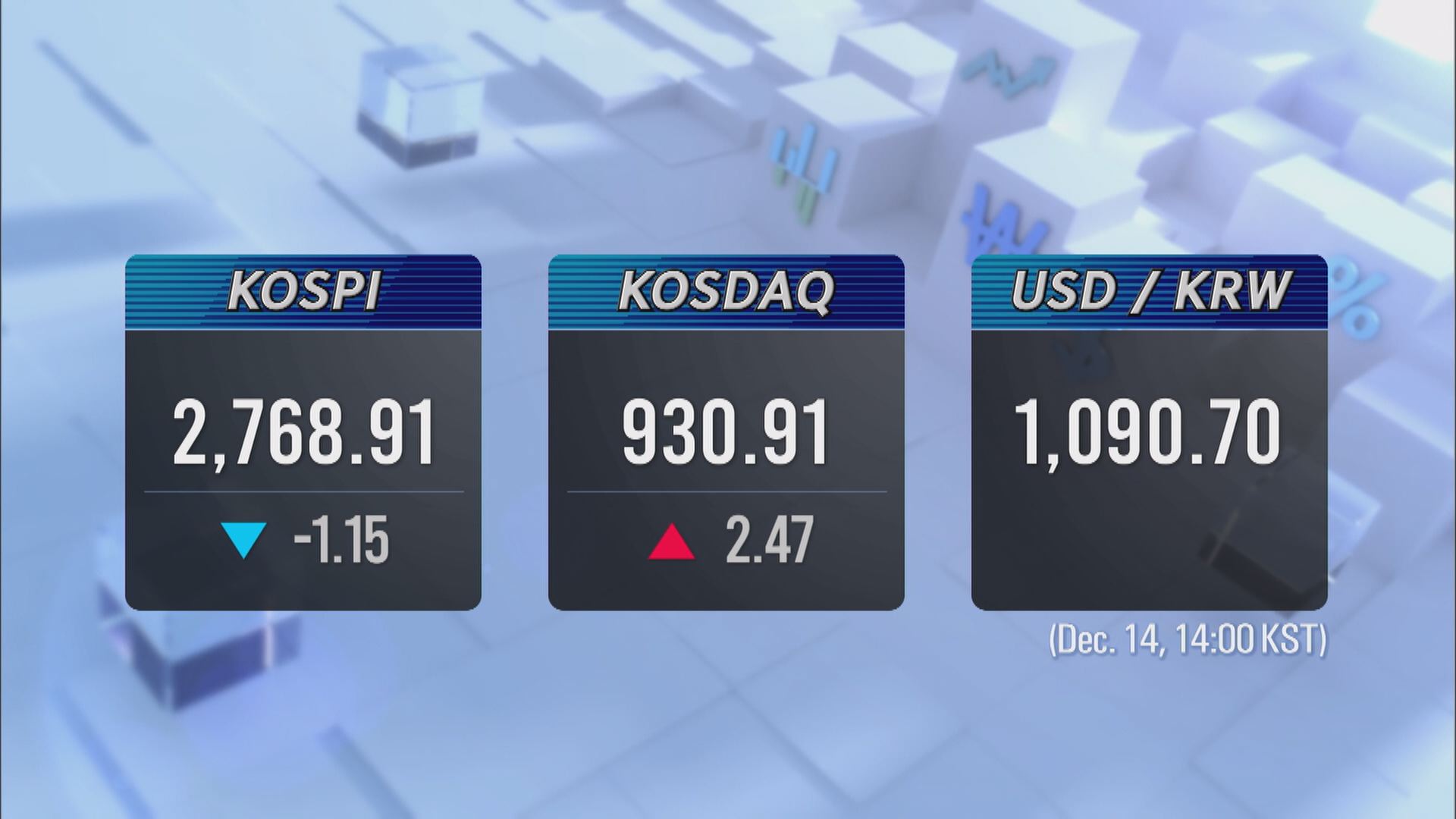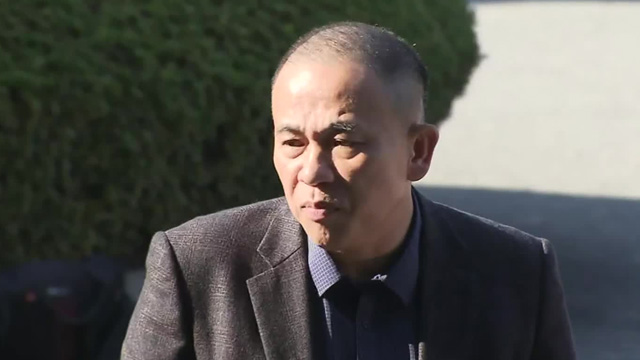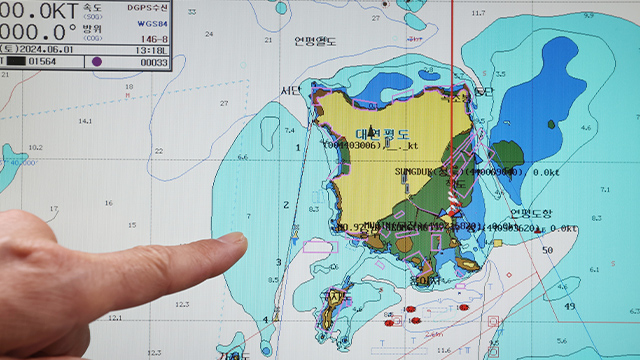CONTINUING ON THE TRADITION OF YUGI
입력 2020.12.14 (15:24)
수정 2020.12.14 (16:47)
읽어주기 기능은 크롬기반의
브라우저에서만 사용하실 수 있습니다.
[Anchor Lead]
Brassware known as “yugi” in Korea is a Korean heritage that originated during the Unified Silla period between 7th and 10th centuries. The key to premium yugi is combining the right ratio of copper and lead. It has become harder nowadays for master yugi artisans to find successors who would carry on the tradition of brassware craft. On top of it, the COVID-19 pandemic has made this winter a tougher time to endure for yugi craftsmen.
[Pkg]
Subtle golden sheen. Clear resonance resembling a bell or a bird call. This sound can be made when lead and copper are combined in the exact ratio of 22 to 78.
[Soundbite] LEE WUN-HYEONG(GIMCHEON TRADITIONAL YUGI MASTER) : "This is the raw ingredient called badegi. I can get unburned lead only when the alloy is using the traditional method. I can get three bowls from one badegi block. It goes into this 1,300℃ furnace called dogani. The metal block would melt inside it."
The molten metal is poured into a mold and a pair of bowls is produced after the mixture is cooled. Master craftsman Lee Wun-hyeong devoted his entire life to yugi.
Brassware has been his family business for generations since 2 centuries ago. His grandfather used to have 30 brassware makers under his wing at one time. But when yugi was replaced by stainless steel bowls and nickel silverware, he gave up brassware and traveled all across the country as an alloy expert.
[Soundbite] LEE WUN-HYEONG(GIMCHEON TRADITIONAL YUGI MASTER) : "My grandfather wanted to preserve the tradition. I was the only one who could protect his honor and tradition."
It's been 10 years since his son-in-law, who studied in the States, quit his job and joined the family business.
[Soundbite] MIN BYEONG-GIL(LEE WUN-HYEONG’S SON-IN-LAW) : "I hope the government would encourage young people to work in this field through support programs."
Yugi products that store food became popular wedding gifts.
But even this industry was not immune to the COVID-19 outbreak.
[Soundbite] LEE GYEONG-AH(LEE WUN-HYEONG’S DAUGHTER) : "The pandemic forced people to postpone weddings and wedding gift-giving, so this has been a difficult year for us."
Traditional yugi is the legacy of Korea’s outstanding alloy-making technique. If more young people were encouraged to carry on the tradition and brassware design was more modernized, the future of yugi in the health-conscious era would be a lot brighter.
Brassware known as “yugi” in Korea is a Korean heritage that originated during the Unified Silla period between 7th and 10th centuries. The key to premium yugi is combining the right ratio of copper and lead. It has become harder nowadays for master yugi artisans to find successors who would carry on the tradition of brassware craft. On top of it, the COVID-19 pandemic has made this winter a tougher time to endure for yugi craftsmen.
[Pkg]
Subtle golden sheen. Clear resonance resembling a bell or a bird call. This sound can be made when lead and copper are combined in the exact ratio of 22 to 78.
[Soundbite] LEE WUN-HYEONG(GIMCHEON TRADITIONAL YUGI MASTER) : "This is the raw ingredient called badegi. I can get unburned lead only when the alloy is using the traditional method. I can get three bowls from one badegi block. It goes into this 1,300℃ furnace called dogani. The metal block would melt inside it."
The molten metal is poured into a mold and a pair of bowls is produced after the mixture is cooled. Master craftsman Lee Wun-hyeong devoted his entire life to yugi.
Brassware has been his family business for generations since 2 centuries ago. His grandfather used to have 30 brassware makers under his wing at one time. But when yugi was replaced by stainless steel bowls and nickel silverware, he gave up brassware and traveled all across the country as an alloy expert.
[Soundbite] LEE WUN-HYEONG(GIMCHEON TRADITIONAL YUGI MASTER) : "My grandfather wanted to preserve the tradition. I was the only one who could protect his honor and tradition."
It's been 10 years since his son-in-law, who studied in the States, quit his job and joined the family business.
[Soundbite] MIN BYEONG-GIL(LEE WUN-HYEONG’S SON-IN-LAW) : "I hope the government would encourage young people to work in this field through support programs."
Yugi products that store food became popular wedding gifts.
But even this industry was not immune to the COVID-19 outbreak.
[Soundbite] LEE GYEONG-AH(LEE WUN-HYEONG’S DAUGHTER) : "The pandemic forced people to postpone weddings and wedding gift-giving, so this has been a difficult year for us."
Traditional yugi is the legacy of Korea’s outstanding alloy-making technique. If more young people were encouraged to carry on the tradition and brassware design was more modernized, the future of yugi in the health-conscious era would be a lot brighter.
■ 제보하기
▷ 카카오톡 : 'KBS제보' 검색, 채널 추가
▷ 전화 : 02-781-1234, 4444
▷ 이메일 : kbs1234@kbs.co.kr
▷ 유튜브, 네이버, 카카오에서도 KBS뉴스를 구독해주세요!
- CONTINUING ON THE TRADITION OF YUGI
-
- 입력 2020-12-14 15:24:48
- 수정2020-12-14 16:47:57

[Anchor Lead]
Brassware known as “yugi” in Korea is a Korean heritage that originated during the Unified Silla period between 7th and 10th centuries. The key to premium yugi is combining the right ratio of copper and lead. It has become harder nowadays for master yugi artisans to find successors who would carry on the tradition of brassware craft. On top of it, the COVID-19 pandemic has made this winter a tougher time to endure for yugi craftsmen.
[Pkg]
Subtle golden sheen. Clear resonance resembling a bell or a bird call. This sound can be made when lead and copper are combined in the exact ratio of 22 to 78.
[Soundbite] LEE WUN-HYEONG(GIMCHEON TRADITIONAL YUGI MASTER) : "This is the raw ingredient called badegi. I can get unburned lead only when the alloy is using the traditional method. I can get three bowls from one badegi block. It goes into this 1,300℃ furnace called dogani. The metal block would melt inside it."
The molten metal is poured into a mold and a pair of bowls is produced after the mixture is cooled. Master craftsman Lee Wun-hyeong devoted his entire life to yugi.
Brassware has been his family business for generations since 2 centuries ago. His grandfather used to have 30 brassware makers under his wing at one time. But when yugi was replaced by stainless steel bowls and nickel silverware, he gave up brassware and traveled all across the country as an alloy expert.
[Soundbite] LEE WUN-HYEONG(GIMCHEON TRADITIONAL YUGI MASTER) : "My grandfather wanted to preserve the tradition. I was the only one who could protect his honor and tradition."
It's been 10 years since his son-in-law, who studied in the States, quit his job and joined the family business.
[Soundbite] MIN BYEONG-GIL(LEE WUN-HYEONG’S SON-IN-LAW) : "I hope the government would encourage young people to work in this field through support programs."
Yugi products that store food became popular wedding gifts.
But even this industry was not immune to the COVID-19 outbreak.
[Soundbite] LEE GYEONG-AH(LEE WUN-HYEONG’S DAUGHTER) : "The pandemic forced people to postpone weddings and wedding gift-giving, so this has been a difficult year for us."
Traditional yugi is the legacy of Korea’s outstanding alloy-making technique. If more young people were encouraged to carry on the tradition and brassware design was more modernized, the future of yugi in the health-conscious era would be a lot brighter.
Brassware known as “yugi” in Korea is a Korean heritage that originated during the Unified Silla period between 7th and 10th centuries. The key to premium yugi is combining the right ratio of copper and lead. It has become harder nowadays for master yugi artisans to find successors who would carry on the tradition of brassware craft. On top of it, the COVID-19 pandemic has made this winter a tougher time to endure for yugi craftsmen.
[Pkg]
Subtle golden sheen. Clear resonance resembling a bell or a bird call. This sound can be made when lead and copper are combined in the exact ratio of 22 to 78.
[Soundbite] LEE WUN-HYEONG(GIMCHEON TRADITIONAL YUGI MASTER) : "This is the raw ingredient called badegi. I can get unburned lead only when the alloy is using the traditional method. I can get three bowls from one badegi block. It goes into this 1,300℃ furnace called dogani. The metal block would melt inside it."
The molten metal is poured into a mold and a pair of bowls is produced after the mixture is cooled. Master craftsman Lee Wun-hyeong devoted his entire life to yugi.
Brassware has been his family business for generations since 2 centuries ago. His grandfather used to have 30 brassware makers under his wing at one time. But when yugi was replaced by stainless steel bowls and nickel silverware, he gave up brassware and traveled all across the country as an alloy expert.
[Soundbite] LEE WUN-HYEONG(GIMCHEON TRADITIONAL YUGI MASTER) : "My grandfather wanted to preserve the tradition. I was the only one who could protect his honor and tradition."
It's been 10 years since his son-in-law, who studied in the States, quit his job and joined the family business.
[Soundbite] MIN BYEONG-GIL(LEE WUN-HYEONG’S SON-IN-LAW) : "I hope the government would encourage young people to work in this field through support programs."
Yugi products that store food became popular wedding gifts.
But even this industry was not immune to the COVID-19 outbreak.
[Soundbite] LEE GYEONG-AH(LEE WUN-HYEONG’S DAUGHTER) : "The pandemic forced people to postpone weddings and wedding gift-giving, so this has been a difficult year for us."
Traditional yugi is the legacy of Korea’s outstanding alloy-making technique. If more young people were encouraged to carry on the tradition and brassware design was more modernized, the future of yugi in the health-conscious era would be a lot brighter.
이 기사가 좋으셨다면
-
좋아요
0
-
응원해요
0
-
후속 원해요
0












![[속보] 북한 함경북도 길주에서 규모 3.1 지진](/data/news/2024/11/09/20241109_mD2iUp.jpg)




이 기사에 대한 의견을 남겨주세요.